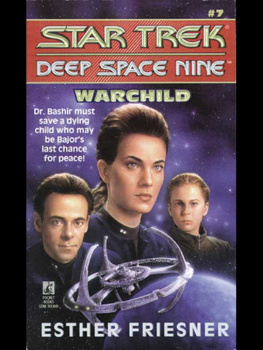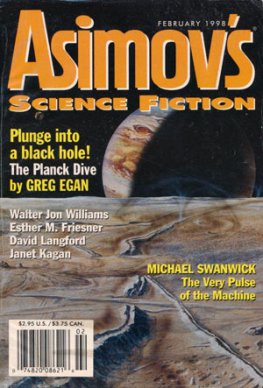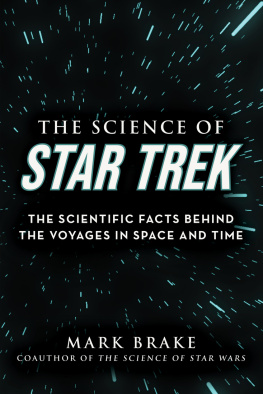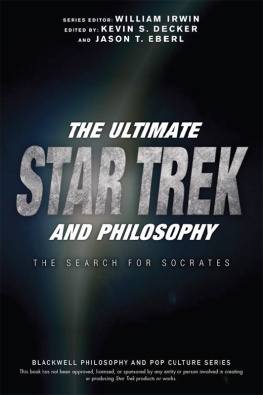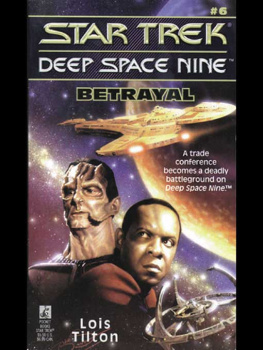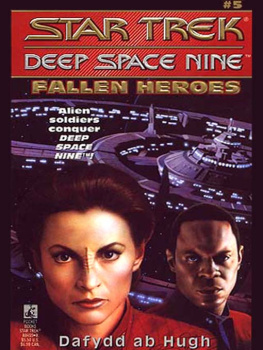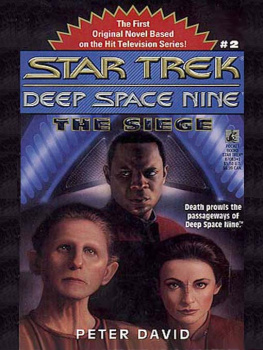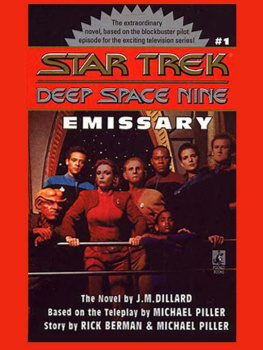Esther Friesner - Warchild (Star Trek Deep Space Nine, No 7)
Here you can read online Esther Friesner - Warchild (Star Trek Deep Space Nine, No 7) full text of the book (entire story) in english for free. Download pdf and epub, get meaning, cover and reviews about this ebook. year: 1994, publisher: Star Trek, genre: Detective and thriller. Description of the work, (preface) as well as reviews are available. Best literature library LitArk.com created for fans of good reading and offers a wide selection of genres:
Romance novel
Science fiction
Adventure
Detective
Science
History
Home and family
Prose
Art
Politics
Computer
Non-fiction
Religion
Business
Children
Humor
Choose a favorite category and find really read worthwhile books. Enjoy immersion in the world of imagination, feel the emotions of the characters or learn something new for yourself, make an fascinating discovery.
- Book:Warchild (Star Trek Deep Space Nine, No 7)
- Author:
- Publisher:Star Trek
- Genre:
- Year:1994
- Rating:3 / 5
- Favourites:Add to favourites
- Your mark:
- 60
- 1
- 2
- 3
- 4
- 5
Warchild (Star Trek Deep Space Nine, No 7): summary, description and annotation
We offer to read an annotation, description, summary or preface (depends on what the author of the book "Warchild (Star Trek Deep Space Nine, No 7)" wrote himself). If you haven't found the necessary information about the book — write in the comments, we will try to find it.
Warchild (Star Trek Deep Space Nine, No 7) — read online for free the complete book (whole text) full work
Below is the text of the book, divided by pages. System saving the place of the last page read, allows you to conveniently read the book "Warchild (Star Trek Deep Space Nine, No 7)" online for free, without having to search again every time where you left off. Put a bookmark, and you can go to the page where you finished reading at any time.
Font size:
Interval:
Bookmark:
"SOMEONE TO SEE YOU, COMMANDER."
Benjamin Sisko looked up from his desk sharply and tried to put on the face of a man who has just been distracted from important business. His heart wasn't in it. He knew he'd been daydreamingsomething he seldom had the leisure or the inclination to do since taking command of Deep Space Nine. Something he had only recently found pleasure in doing, too. A mind that wandered could sometimes wander back into the past.
"Yes, what is it?" he asked, a trifle sharply.
Major Kira Nerys met his eyes with her own level gaze. "Are we interrupting something important, sir?" she asked. Her dry, slightly amused tone let Sisko know straight off that she knew he was temporarily unoccupied, but she'd be willing to go along with the act if he felt like pretending he'd been busy.
"Not at all, Major," Sisko said, dropping all pretense and giving, her one of his rare smiles. "Who wants to see?"
The words froze in his throat as the Bajoran monk came gliding into the commander's office.
Sisko felt his body tense. No matter how hard he tried, no matter how earnestly he told himself to relax, the sight of a Bajoran monk always set his entire being on edge. He rememberedhe could not help but rememberhis first encounter with one of that brotherhood when he and his son, Jake, were newly come to Deep Space Nine. Then his thoughts had been set solely on how to get out of this unlooked-for command, how to get himself and Jake back to Earth, even if it meant taking a post with less responsibility, or leaving Starfleet altogether.
That first Bajoran monk had looked him in the eye in much the same way this one was doing now, but to Jake Sisko it had felt as if the man were looking into his soul. That monk spoke words Sisko had not understoodthe Prophets? What Prophets?not then. Sisko brushed the words aside. He had lost track of all the exotic religions he'd encountered since joining Starfleet. He did his best to offer them all a measure of respect, if not belief. He had never expected one of them to reach out and touch him to the heart the way the faith of Bajor had done.
It had touched him deeply, helped him come to terms with his past, the death of his wife, his role as commander on Deep Space Nine. It was a strong source of powerstrange power, unknown powerthe mystic faith that permeated every aspect of Bajoran life. And like many things strong and strange and not fully known, it put Sisko on guard.
"What can we do for you?" he asked the monk, trying to sound cordial if he couldn't bring himself to sound friendly. "No trouble in the temple, I hope? The one aboard, I mean." He realized that to a Bajoran, there could be only one Templethat vast and eerily beautiful complex of domed buildings and lush gardens that the departing Cardassians had vandalized but could not utterly destroy. When Sisko spoke of the temple, he first thought of the small Bajoran shrine aboard the space station.
The monk's gaze did not waver. He stood before Commander Sisko with his hands tucked into the voluminous sleeves of his rust-colored robes. A skin-tight cap covered his head, leaving only his weather-beaten face and ears exposed. His beard was short, black sprinkled with gray. Sisko realized that this monk was no ancient sage, but a fairly young man. The few wrinkles he did have were lines of toil, not of age.
"Commander Sisko," he said. The strength behind the voice convinced Sisko he was right in his assessment of the monk's years. "I am Taren Gis, a monk in service to the Prophets. I have come to you to ask for aid."
Sisko became aware that he was clutching the arms of his chair too hard. He made himself relax his grip. "Go on. What sort of aid?"
"It's the camps," Major Kira blurted. Sisko was startled. It wasn't a rare thing for Kira Nerys to forget herself, to barge in with demands and opinions, asked for or not. But usually those were angry outbursts, brief flashes of a temper sharpened and made bitter by growing up under the brutalities of the Cardassian occupation, honed by her years as a Bajoran freedom fighter.
"Camps?" Sisko echoed.
"The refugee camps, Commander." There was no anger in the Bajoran woman's voice; only pain. "We don't have an exact tally of how many of them there are, but I'm surprised Starfleet never mentioned them to you at all. I suppose they didn't think it was important enough to bring to your attention." Now a sliver of the old bitterness slipped back into her words.
"Starfleet is aware that there are refugee camps on Bajor" Sisko countered. One line buried somewhere in my briefing material, he thought ruefully. If that. "We're working with the provisional government to speed up resettlement procedures. Most of the camps have already been emptied and"
"Labor camps," Major Kira snapped. "The Cardassians did their best to empty those before they left. They used their own methods of resettlement. Her tone left no question that the Cardassian idea of resettlement was permanent. "The refugee camps are another story."
Sisko turned to the monk. "Brother Gis, how many camps are there?"
The monk made a sign with his hands indicating that he did not know. "Commander, what are numbers? Your people and mine speak of the Cardassian occupation as lasting sixty years. You count these years in days, I count them in lives. You believe it is over, simply because the Cardassians are no longer here, but I see it otherwise. I see it as too many deaths that did not have to be, too much land laid waste, too many lives that have become horribly transformed. I have charge of a single camp; it is all I know. It is located in the Kaladrys Valley. Once this was the choicest, most fertile farmland on all Bajor. The Cardassians knew that as well as my people."
"The Cardassian installations in the valley set up a system of forced agricultural production," Kira said. "No mercy for the farmer who didn't meet his predetermined quotas. The quotas were unrealistic, but the Cardassians didn't care. They'd take what they could get, and if they happened to find an excuse to kill more of our people in the process" She shrugged, though it was more like a shudder. "Those who could escape, did. But they're mostly families in the Kaladrys Valley. You can't run so fast with children." She spat out the words: "They were easy to catch."
"I only ask your help for one camp," the monk continued. "The one where I and two of my brethren serve. It is near the old farming village of Lacroya. We are luckier than most; the destruction of Lacroya was fairly recent and incomplete. We have been able to glean much useful material from the ruins. Many of the people originally with us were farmers, and could coax crops from rockor so they liked to say. They rallied the children to help them plow a few fields and to plant seedlings. Our relief supplies from the provisional government have been as much as charity could make them, but to give charity to others, you must first have enough to provide for your own family. There are very few Bajorans who can say that these days. So our farmers decided to take back the land and feed themselves."
"That's commendable," Sisko remarked. "And I assure you, if there is anything we can do to help them regain their independence"
A wistful smile touched the monk's face. "They are dead now."
"Dead?" Sisko's hands clutched the armrests of his chair again. "What happened?"
The monk held out his hands, palms upward. "We called it camp fever, for want of another name. One of my brethren is a healer of great skill. In the Temple, he studied the ancient records of sickness and health. He thought it was an affliction very like satai, the swelling fever. He applied all the known remedies for satai to the victims." He lowered his hands. "They died anyway."
Font size:
Interval:
Bookmark:
Similar books «Warchild (Star Trek Deep Space Nine, No 7)»
Look at similar books to Warchild (Star Trek Deep Space Nine, No 7). We have selected literature similar in name and meaning in the hope of providing readers with more options to find new, interesting, not yet read works.
Discussion, reviews of the book Warchild (Star Trek Deep Space Nine, No 7) and just readers' own opinions. Leave your comments, write what you think about the work, its meaning or the main characters. Specify what exactly you liked and what you didn't like, and why you think so.

